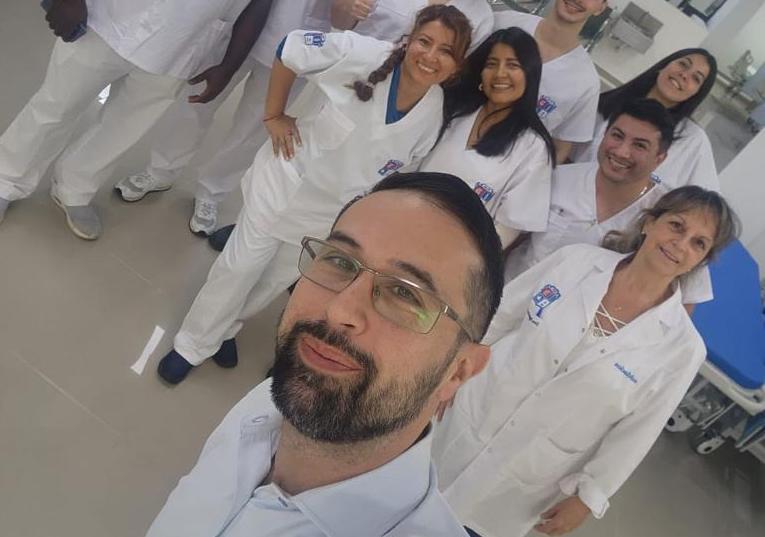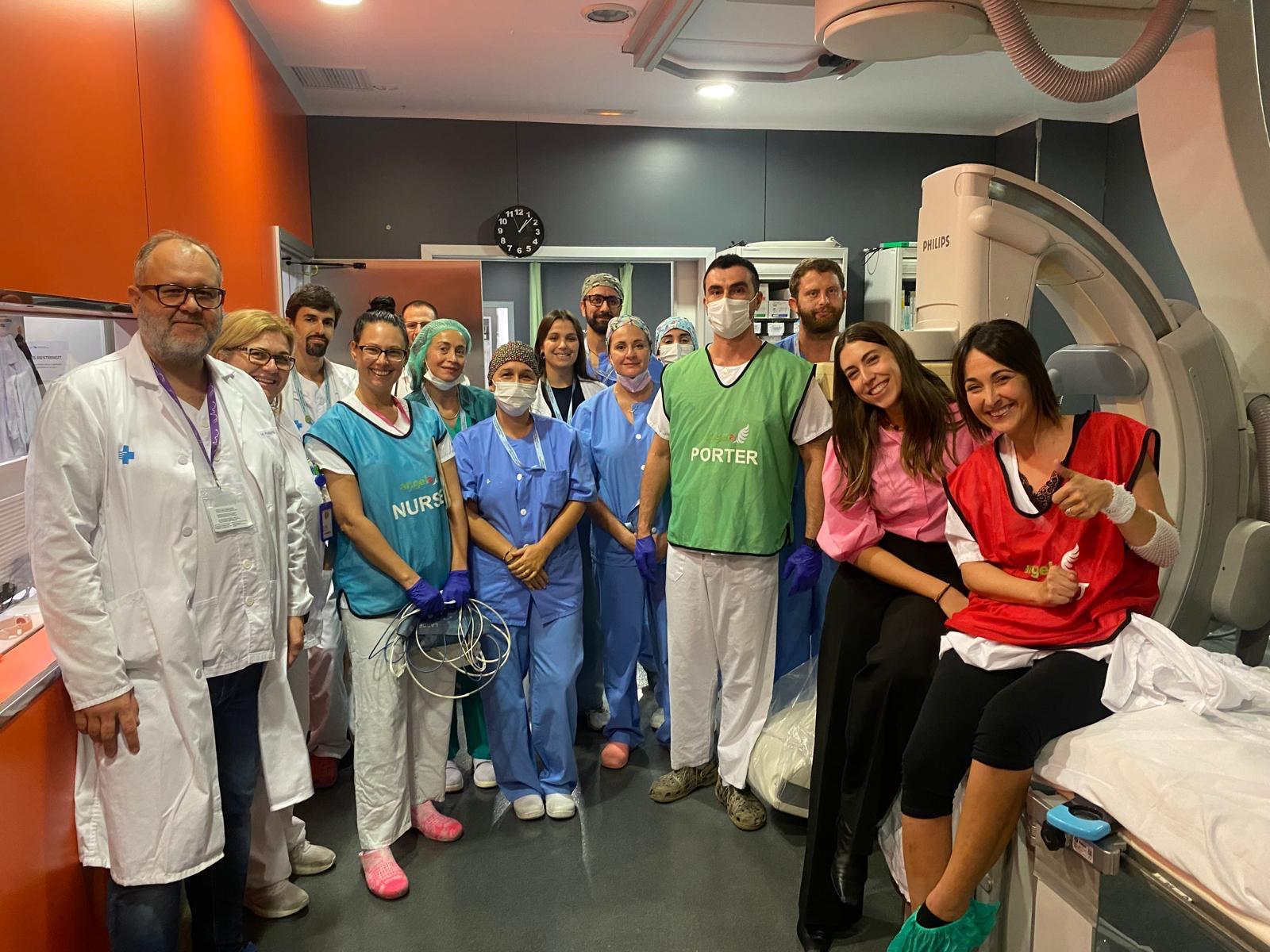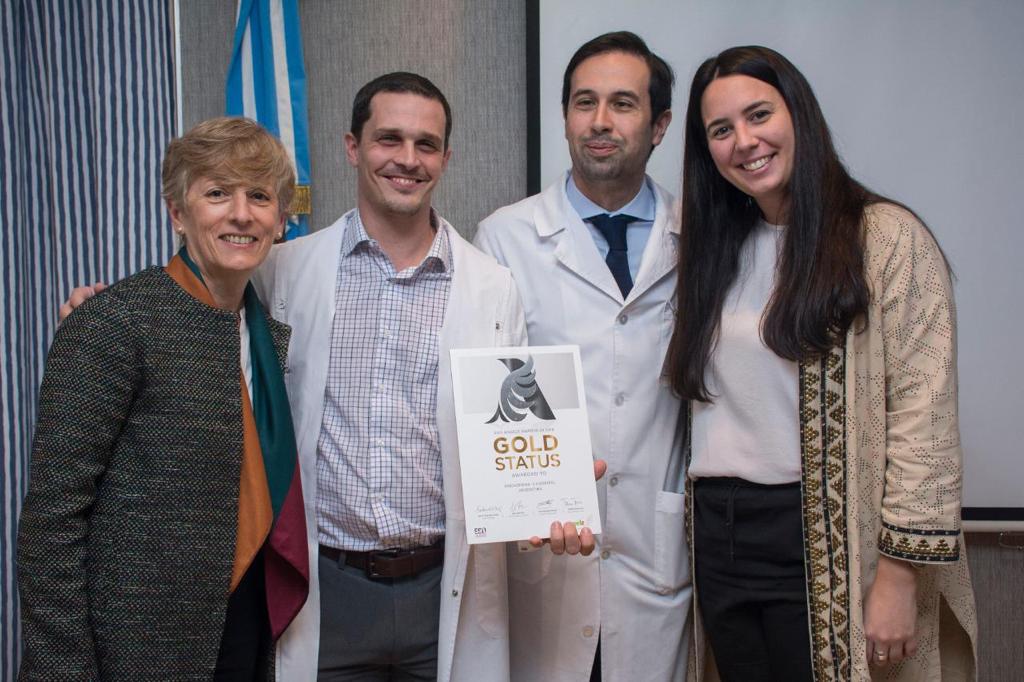
Amikor először tért vissza Ukrajnából, nehezen tudott hozzászokni a csendhez. Természetesen megkönnyebbülés volt, hogy távol volt a háború hangjaitól, de minden alkalommal, amikor egy mentő a Buenos Aires felett szúrta át a levegőt, dr. Adolfo Savia kiugrott a bőréből.
A háború kezdetétől fogva Ukrajnába szeretett volna utazni, és 2022 szeptemberében a Harvard Humanitarian Initiative végre lehetővé tette ezt. A folyamatos bombázás, beleértve a kórházakat és klinikákat, és a frontvonalban élők iránti mély empátiát, egy háborús zónában való munkavégzést „komplikált élménnyé” tette, de ez egy egyszerű feltételezésen alapult. Dr. Savia így nyilatkozik: „sürgősségi orvos vagyok – amikor az emberek megsérülnek, ott kell lennem.”
Ugyanez a helyszín irányítja napi tevékenységeit – a sürgősségi osztály vezetőjeként, először a Sanatorio Anchorena Recoletában, az elmúlt 18 hónapban a San Juan de Dios-ban, most pedig a májusban megnyílt Pilari Központi Kórházban; az ACUDIR magán sürgősségi orvosi szolgáltatás korábbi orvosigazgatójaként, az Argentin Orvostudományi Társaság Sürgősségi Tanácsának elnökeként, a magán- és állami egyetemek sürgősségi orvosi tanáraként, valamint ukrajnai küldetés orvosaként.
„Az idő száz százalékában a sürgősségi gyógyszerre gondolok” – mondja Adolfo Savia. „Sürgősségi orvos vagyok, ezt teszem, és ez határoz meg engem. A szakterületem az, hogy időfüggő sürgősségi kezeljem a betegeket. Kiképeztek, hogy ott legyek a legrosszabb pillanatban, és fontos változást érek el.”
A katasztrófák vagy az időfüggő vészhelyzetek miatti halál megelőzése attól függ, hogy helyesen cselekszünk-e egy szűk lehetőségablakban. Az akut ischaemiás stroke kezelése nem különbözik attól, hogy a sikeres beavatkozás megjutalmazhatja Önt a szeme előtt felépülő beteg ritka látásával.
„Ez a leglátványosabb szenzáció” – mondja Dr. Savia. „A hatás óriási a beteg és az egészségügy rendszer számára egyaránt. A beteg állapota javul, és megéri, de ahhoz, hogy a beteg jobbá tegyük, a rendszert is jobbá kell tennünk – különben nem lenne több egy balesetnél. A munkát meg kell sokszorozni, hogy a rendszer minden beteg esetében megváltoztassa a valóságot.”
Ez a közös elkötelezettség minden stroke beteg kezelés minősége iránt képezi a alapját Dr. Savia és az Angels Initiative – egy öt évre és három kórházra kiterjedő partnerség – közötti természetes szövetségnek.
„Az Angels megváltoztatta az életemet” – mondja. „Lehetőséget adott arra, hogy változást hozzak mások életébe.”
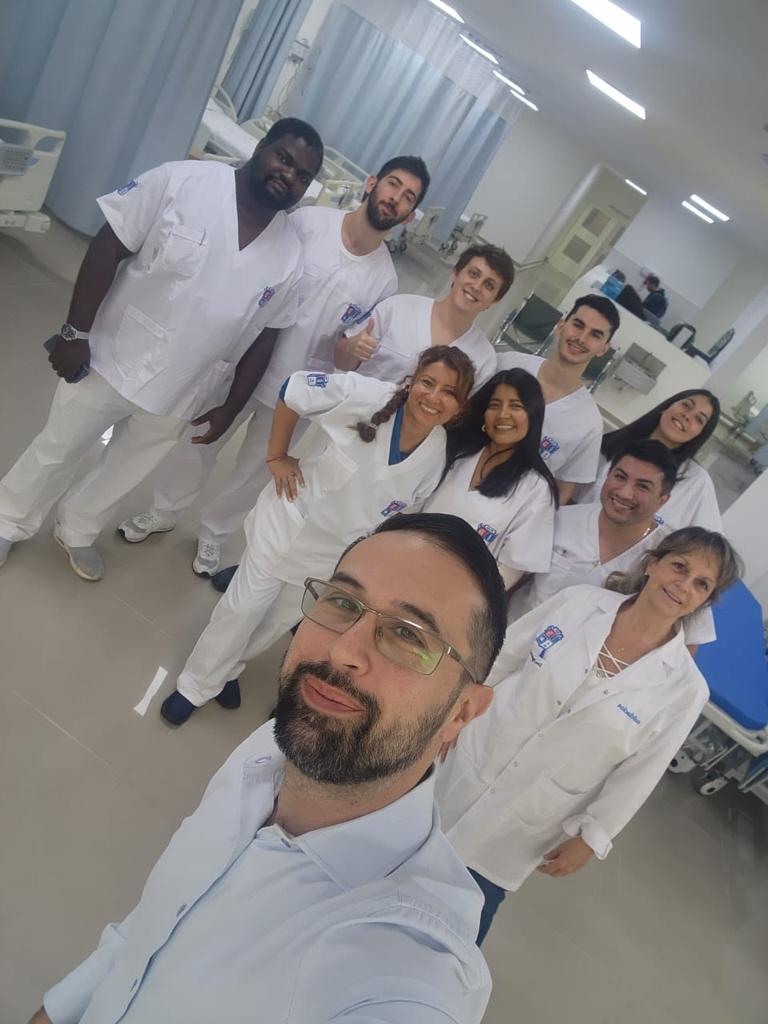
Időről időre Dr. Savia továbbra is bemutatja a hallgatóknak és az új kollégáknak a Sanatorio Anchorena Recoleta 2018-ban tartott első stroke szimuláció workshopjának videóját. Ebben a szimuláció a beteg „kezelték” a CT-n, így amikor az első valódi beteg megérkezett, a CT-n is kezelték – ami kulcsfontosságú prioritást jelent a legtöbb stroke-kezelő kórháznak szerte a világon. A kórház első WSO Angels díj 2019 elején érkezett, és bár hamarosan öt gyémántdíjjal meg is haladták, Dr. Savia négy éven keresztül mutatta be az aranyat az irodai falán.
„Ez volt a legfontosabb” – mondja. „Emlékeztető volt arról, hogy mit értünk el, felismerte mindenki erőfeszítéseit, aki ezt lehetővé tette, és kiállt minden olyan ember számára, akinek segíteni tudtunk.”
Amikor 2022 elején csatlakozott a San Juan de Dios kórházhoz, Dr. Savia magával hozta a tapasztalatait és a Recoletában kidolgozott stroke protokollt, így sokkal gyorsabban történt a változás. Az új Pilar-i kórházban, ahol lehetősége volt a sürgősségi egység tervezésére a semmiből, optimalizálta a stroke-ra, beleértve a CT-szkenner elhelyezését a sürgősségi bejárattól mindössze méterre.
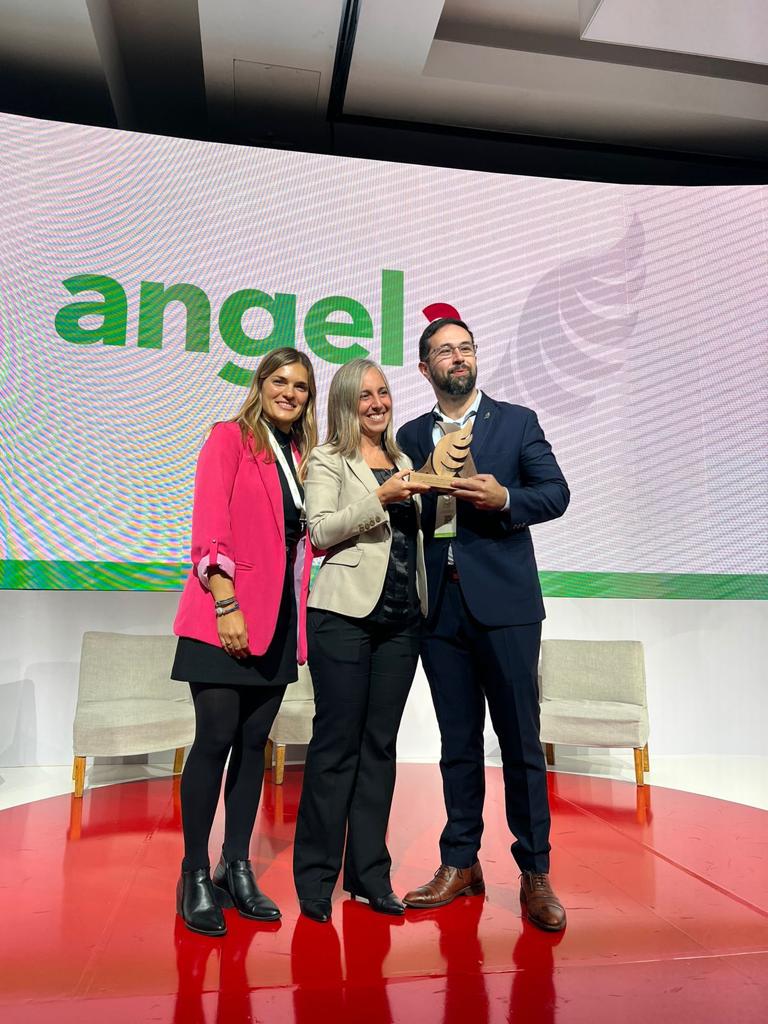
Minden esetben úgy találta, hogy a stroke-ban szenvedő betegek javára bevezetett útvonalváltozások – mint például a beteg előzetes értesítése és közvetlenül a CT-hez történő eljuttatása – minden vészhelyzetben előnyt jelentenek, mivel a kórházi és a kórházi kezelést megelőző csapatok közötti rést zsugorították.
„Ez egy nagyon hatékony módszer az akadályok lebontására” – mondja Dr. Savia. „Ha a csapatok közel vannak a stroke, akkor közel vannak minden trauma miatt.”
Az ACUDIR orvosigazgatójaként felügyelte egy olyan alkalmazás fejlesztését, amely megerősítette a legfontosabb intézkedéseket a kórházi kezelés előtti fázisban – „nem több, nem kevesebb, csak a szükséges”. Az ilyen minőségben végzett munka egyedi betekintést nyújtott a kórházi kezelés előtti perspektívába, de ahelyett, hogy két eltérő nézőpontot írt volna le, hangsúlyozza az ellátás folytonosságát.
"Ugyanaz a beteg" - mondja. „Ez egy lánc. Attól a perctől kezdve, hogy valaki tárcsázza a 107-et, a stroke protokoll elkezdődik. A rekanalizáció akkor kezdődik a mentő, amikor felismeri a tüneteket, és gyorsan cselekszik, hogy a beteg olyan kórházba vigye, ahol kezelés kaphat.
„Ugyanaz a beteg, csak különböző pillanatokban és helyzetekben, és ha a lánc eltörik, akkor nem lesz jó kimenetel.”
Ez a túlélési lánc (gyakrabban használják a szívmegállás utáni beavatkozások leírására) az Angels-i forgatókönyv kulcsfontosságú koncepciója a stroke-os betegek kimenetelének megváltoztatásához. Ugyanígy az a kötelesség, hogy hagyjuk az örökséget, egy másik kifejezés, amelyet Dr. Savia készített. „Hiszek Angels minden mondatában” – vallja. „Mindannyiukat „megveszem”, ők a mottóm arra, amit csinálok.”
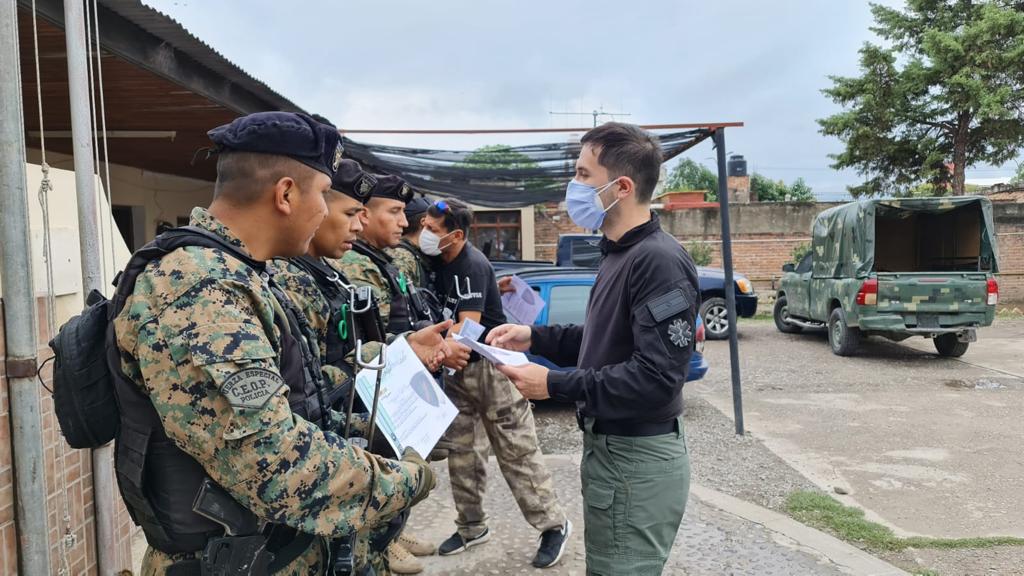
DR SAVIA magyarázata arról, hogy mit csinál, egyenlő részek egyértelműsége és együttérzése.
Azt mondja: „Gyógyszert tanultam, hogy sürgősségi orvos legyek. Pontosan arra a helyre szerettem volna kerülni, ahol a „dolgok történnek”, segíteni akartam az embereknek, meg akartam oldani a problémákat, és a segítséget igénylő következő beteg akartam lépni.
„Megmondom a diákjaimnak, hogy ez a legaszimmetrikusabb orvos-beteg kapcsolat, mert sürgősségi a beteg nem minket választott. Nem kérdezték, hol dolgozik Adolfo? Nem engem választanak, de mivel én minden nap úgy döntök, hogy ezt a munkát végzem, teljesítenem kell és meg kell szárnyalnom a beteg elvárásait. Jobban kell teljesítenem.
„A sürgősségi gyógyszereknél nagyon rövid idő áll rendelkezésére a halál megelőzésének, a szövődmények enyhítésének, valamint a betegek és rokonok, sőt a közelben tartózkodók nyugodt és kedves fogadásának lehetőségére, akik a legrosszabb pillanatban találják magukat, és néha szörnyű dolgok áldozatai.”
Dr. Savia álláspontja egy sürgősségi orvos álláspontja, aki traumát tapasztalt mind a háborús zónában, mind a sürgősségi osztályon. De képzeljünk el egy olyan világot, amelyben mindenki ugyanúgy gondolkozik az emberi szenvedésről – mint egy „lenyűgöző lehetőség arra, hogy jó dolgokat csináljon sötét pillanatokban”.
